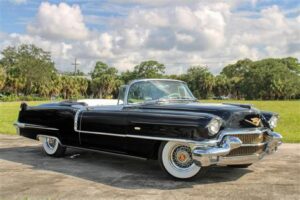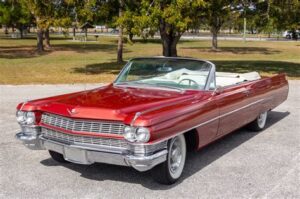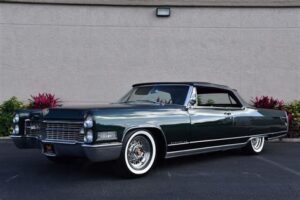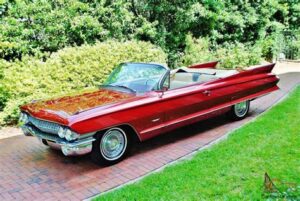When it comes to maximizing your Ford F150’s performance and longevity, one crucial component often overlooked is the Cadillac converter. This vital part not only plays a significant role in reducing emissions but also impacts the overall efficiency of your vehicle. In this article, we delve into the importance of the Ford F150 Cadillac converter, exploring how it influences performance, signs that indicate it may need replacement, and how to select the right one for your truck. Whether you’re looking for a step-by-step guide to replacing your Cadillac converter or simply want to understand its benefits better, we’ve got all the information you need to keep your Ford F150 running smoothly. Let’s gear up to unlock the full potential of your vehicle!
Understanding The Importance Of The Ford F150 Cadillac Converter
The Ford F150 is known for its robust performance and reliability, and one of the key components that contribute to its effectiveness is the Cadillac converter. This vital part plays a crucial role in the vehicle’s exhaust system, primarily focusing on reducing harmful emissions and ensuring compliance with environmental standards.
The primary function of the Cadillac converter is to convert toxic gases produced during the combustion process into less harmful emissions before they exit the exhaust system. This transformation is essential for maintaining an eco-friendly ride and promotes overall engine health.
In addition to its environmental benefits, a well-functioning Cadillac converter also impacts your Ford F150‘s performance. A clogged or failing converter can lead to increased back pressure, which can result in decreased engine efficiency and power. It’s crucial to monitor the performance of your Cadillac converter to ensure that your truck runs smoothly and efficiently.
Investing in a quality Cadillac converter is not only a matter of adhering to regulations but also enhancing the longevity and functionality of your Ford F150. Therefore, keeping this component in good condition is integral to maintaining the overall health of your vehicle.
How A Cadillac Converter Affects Ford F150 Performance
The Ford F150‘s performance can be significantly influenced by the condition and functionality of its catalytic converter. This essential component is responsible for converting harmful exhaust gases into less harmful emissions before they are released into the atmosphere. A well-functioning catalytic converter helps ensure optimal engine efficiency and power output.
When the catalytic converter becomes clogged or malfunctions, it can lead to detrimental effects on the Ford F150. Some of the key performance changes include:
- Reduced Engine Power: A failing catalytic converter can restrict exhaust flow, resulting in decreased engine power and acceleration.
- Poor Fuel Efficiency: If the catalytic converter is not functioning properly, the engine may work harder, consuming more fuel than necessary.
- Increased Emissions: A malfunctioning converter may not effectively filter harmful pollutants, leading to higher emissions and potential failures during emissions testing.
- Overheating: A clogged catalytic converter can cause excessive heat buildup in the exhaust system, potentially damaging engine components.
To maintain the performance of your Ford F150, it’s crucial to regularly check and service the catalytic converter, ensuring that it is in good working condition. This proactive approach not only enhances performance but also supports environmental regulations.
Replacing The Cadillac Converter: A Step-by-Step Guide For Ford F150
Replacing the Cadillac converter on your ford f150 is an important maintenance task that can significantly affect performance and emissions. Follow this step-by-step guide to ensure a successful replacement process.
Step 1: Gather Necessary Tools and Materials
- New Cadillac converter compatible with your ford f150
- Jack and jack stands
- Wrench set
- Socket set
- Oxygen sensor socket (if applicable)
- Replacement gaskets
- Safety glasses and gloves
Step 2: Prepare Your Vehicle
Park your ford f150 on a flat surface and engage the parking brake. Use the jack to lift the front of the truck and secure it with jack stands. This will provide easy access to the exhaust system.
Step 3: Locate the Cadillac Converter
The Cadillac converter is typically located between the engine and the exhaust system. Depending on the model year of your ford f150, you may find it nearer to the engine or further down the exhaust pipe.
Step 4: Remove the Old Cadillac Converter
Start by disconnecting the oxygen sensors attached to the converter. Use the oxygen sensor socket for this step. Then, remove the bolts securing the Cadillac converter to the exhaust pipe and any other connected components. Take care when removing the old unit, as it may still contain exhaust gases.
Step 5: Install the New Cadillac Converter
Position the new Cadillac converter in place and secure it with the bolts you removed earlier. Make sure to replace any gaskets to prevent leaks. Reconnect the oxygen sensors and ensure they are tightened appropriately.
Step 6: Lower the Vehicle and Test
Once you have installed the new Cadillac converter, carefully lower your ford f150 back to the ground. Start the engine and listen for any unusual sounds. If everything appears to be functioning correctly, take your vehicle for a short drive to ensure that the replacement has resolved any previous issues.
Completing this replacement can help maintain the performance of your ford f150, as well as ensure compliance with emission regulations. Regular maintenance and timely replacement of the Cadillac converter can lead to improvements in fuel efficiency and overall vehicle reliability.
Signs Your Ford F150 Needs A New Cadillac Converter
Recognizing the signs that your ford f150 needs a new Cadillac converter is crucial for maintaining its performance and compliance with emissions standards. Here are some key indicators to watch for:
- Check Engine Light On: If the check engine light illuminates on your dashboard, it may indicate an issue with the Cadillac converter. A diagnostic test can help determine if it’s the root cause.
- Decreased Fuel Efficiency: A failing Cadillac converter can cause your engine to work harder, leading to increased fuel consumption.
- Unusual Noises: If you hear rattling or clunking noises coming from the undercarriage of your ford f150, it could mean that the catalyst inside the converter is damaged.
- Foul Odor: A strong smell of sulfur or rotten eggs can indicate a problem with the Cadillac converter. This often means that it is not effectively filtering exhaust gases.
- Power Loss: If you notice a lack of acceleration or overall power when driving your ford f150, it might be due to a clogged converter restricting exhaust flow.
- Excessive Exhaust Emissions: If you see visible smoke or strong fumes from your exhaust, it’s a sign that the converter might not be functioning properly, leading to harmful emissions.
By paying attention to these signs, you can ensure that your ford f150 remains in optimal condition and address any Cadillac converter issues promptly.
Choosing The Right Cadillac Converter For Your Ford F150
Choosing the right Cadillac converter for your Ford F150 is essential to ensure optimal performance and efficiency. Since different models and years of the F150 may have varying specifications, it’s crucial to consider a few key factors before making a purchase. Here are the most important considerations:
| Factor | Details |
|---|---|
| Compatibility | Ensure the converter is designed specifically for your Ford F150 model and year. |
| Material | Look for converters made from high-quality materials that resist rust and corrosion. |
| Type | Decide whether you need a direct replacement or a high-performance aftermarket option. |
| Emission Standards | Make sure the converter meets local emission regulations—this is vital for legal compliance. |
| Warranty | Check if the product comes with a warranty for added protection against defects. |
By considering these factors, you can make an informed decision when selecting a Cadillac converter for your Ford F150. Good choices can lead to improved fuel efficiency, better overall performance, and ultimately, a more enjoyable driving experience.
Frequently Asked Questions
What is a catalytic converter and what role does it play in a Ford F150?
A catalytic converter is an essential component of the vehicle’s exhaust system, responsible for converting harmful pollutants from engine exhaust into less harmful emissions. In a Ford F150, it helps reduce emissions and meets environmental regulations.
What are the common signs that a catalytic converter in a Ford F150 may be failing?
Common signs of a failing catalytic converter include decreased engine performance, a noticeable drop in fuel efficiency, a rotten egg smell from the exhaust, and the check engine light illuminating on the dashboard.
How much does it typically cost to replace a catalytic converter in a Ford F150?
The cost to replace a catalytic converter in a Ford F150 can vary widely depending on the model year and whether you use OEM or aftermarket parts. Typically, it can range from $1,000 to $2,500, including parts and labor.
What factors can influence the longevity of a catalytic converter in a Ford F150?
Factors that can influence the lifespan of a catalytic converter include driving habits, the quality of fuel used, engine performance issues, and regular maintenance. Proper care can help extend its lifespan.
Are there any aftermarket catalytic converters available for the Ford F150?
Yes, there are numerous aftermarket catalytic converters available for the Ford F150. However, it’s crucial to ensure that any aftermarket part meets EPA regulations and is compatible with your specific model.
Can a faulty catalytic converter cause other issues in a Ford F150?
Yes, a faulty catalytic converter can lead to other problems, such as increased engine wear, poor fuel economy, and potential damage to the engine and exhaust system due to back pressure.
What is the importance of consulting a professional mechanic regarding the catalytic converter in a Ford F150?
Consulting a professional mechanic is important to accurately diagnose any issues with the catalytic converter and to ensure proper installation of replacements. This can help avoid further damage and costly repairs down the line.





